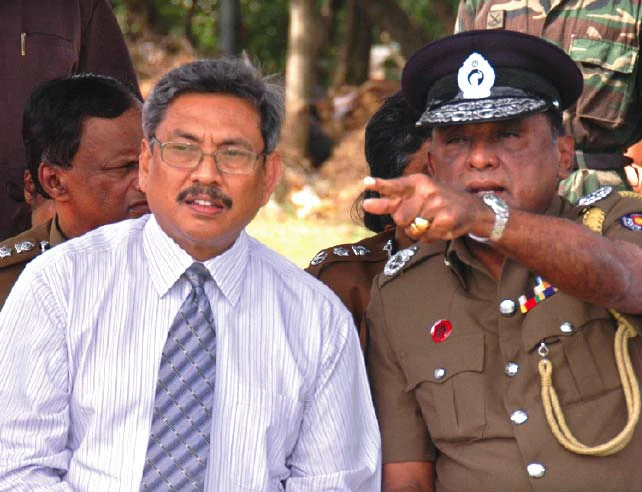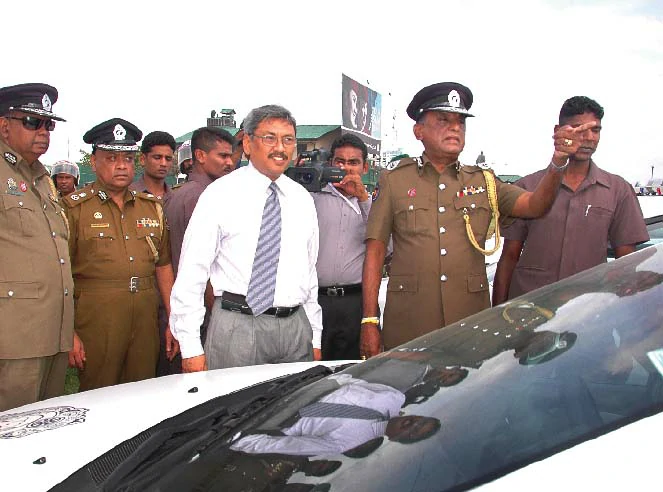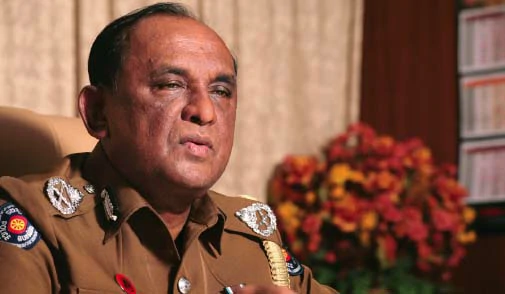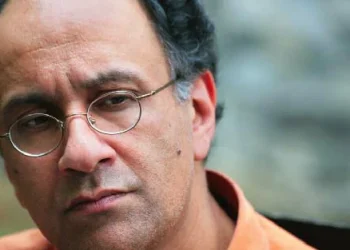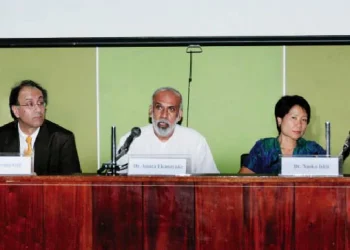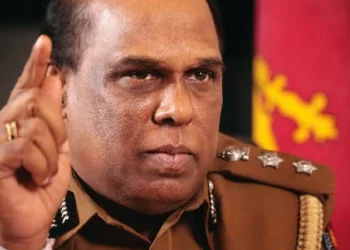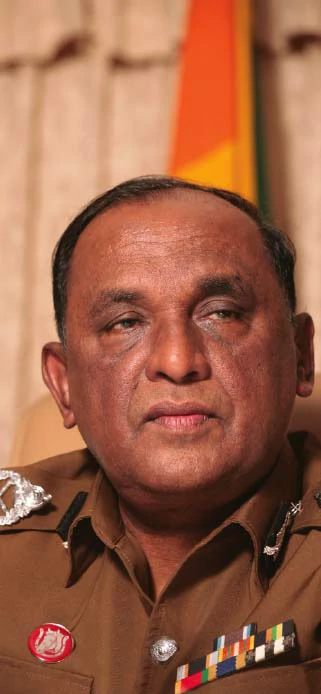
The Sri Lanka Police has evolved to counter the LTTE threat in all areas of the country, especially in the City of Colombo. This is IGP Wickramaratna’s story on how the Police has secured the Colombo city. The Sri Lanka Police is entrusted with the task of maintaining Law and Order in the country. As the main law enforcement agency, the Police Force has evolved to counter the LTTE threat in all areas including but not limited to the City of Colombo. Many were concerned that Colombo may become a battle ground with the cornering of the LTTE in the North. However, the timely actions of the Police and the Armed Forces working as a team has been able to prevent any major incidents in those areas so far. Inspector General of Police Jayantha Wickramaratna is the strength behind the Intelligence Wings under his command. He is adamant to work with the public in maintaining a constant vigil in the city. His commitment is unwavering. This is his story on how the Police Force has secured the City of Colombo.
What has been the biggest challenge since you assumed your duties as the IGP?
The first task I had, was to ensure security at the SAARC conference in August 2008. It was a huge challenge. Many Indian and Pakistani delegations came in advance to assess the security situation. We had a very well coordinated programme and the first task was to create a peaceful atmosphere to conduct the SAARC conference. We had Civil Security Committees along the road up to Colombo. Senior DIG in Western Province that is Nimal Mediwake and the Senior DIG in charge of logistics, Mr Ilangakoon divided the responsibility and we conducted co-ordination meetings and reviewed the intelligence available.
I had to concentrate on divided areas specially because DIGs were deployed to handle the welfare matters, communication, logistical requirements and firearm training. We had a Ministerial Security Division and the Presidents’ Security Division to protect the VIPs who came from various countries. Intelligence agencies such as the State Intelligence Service, the Directorate of Military Intelligence etc. were brought to one table and they were asked to bring information they get and then we conducted this operation. My people were with me and they never let me down and they gave the fullest co-operation. Thanks to the guidance given by the President and the Secretary of Defence and the support of the three Commanders of the Armed Forces, everything went very smoothly.
Another challenge was the Eastern Provincial Council election and there the threat was very high, because Trincomalee, Batticaloa and Ampara used to be LTTE dominated areas. But by then we were motivated because we faced the international challenge during SAARC and we produced the results. All went smoothly and even the President visited those areas to address the election meetings.
How have you ensured security in Colombo?
I will concentrate on some of the main events that took place and how we ensured security at these events. In spite of all the threats the President wanted to celebrate Independence Day on a grand scale with an armed services parade, attended by 5000-6000 service personnel and I was asked to provide security. I am actually very grateful to Defence Secretary Gotabaya Rajapaksa, who coordinated our efforts. We cannot work alone because we need a lot of co-operation, assistance and interaction between the services. So the Defence Secretary chaired the conferences in addition to the Security Council at the Ministry of Defence, he was chairing with the service personnel and we shared the intelligence and it was a very successful 61st Independence Day. Then we had the Dayata Kirula exhibition at the BMICH, and on a single day a minimum of 160,000 people entered the exhibition and not a single incident took place, and it went smoothly.
We Have Dedicated Commanders And We Have The Fullest Support From His Excellency The President And The Secretary Of Defence. Having Faced Terrorism On The Ground Himself, The Secretary Of Defence Has Produced Results.
Could you tell us in general how the Police are countering terrorism in Colombo?
It is a matter of methodical planning because we are fighting against the most ruthless terrorist organisation in the world. So, first we collected intelligence and we depend on our intelligence agencies, we guided the public and requested the public to co-corporate with us. We have the Police Rewards Fund that rewards police officers who do exceptional work and we used the same to provide financial assistance to the public who assisted us. For example, you must have heard of the bomb blast near St Bridget’s Convent and how the two police constables reversed the bus immediately and how the driver and the conductor immediately took action. Within minutes the blast took place, so it was a quick response and we gave Rs 100,000 each to the bus driver, the conductor and the two police constables who assisted. That is how we show our appreciation.
In Wattala area there was a recovery of firearms and those who provided information were given handsome cash rewards. In some cases we gave them Rs 250,000 and gave them wide publicity so that people will be encouraged by them. In another incident, a vigilant lady noticed the bomb in the Padukka bus and we gave her Rs 100,000 as a cash reward because by doing that the public is motivated to help us. It is also important to mention that even if you have information and public co-operation you cannot succeed unless there is active participation and contribution by our Police officers. The Police officers have to be motivated. In 2008, we recovered a massive amount of deadly C4 explosives, which is the world’s deadliest explosives.
Usually what the LTTE does is, firstly they will plan out by conducting an intelligence operation and then identify a place where they can keep arms, ammunitions and explosives. Then they will harbour their cadres because they can go from here to collect firearms to conduct the operation. So, the main success is, we had very good evidence.
Secondly, we had ample assistance from the public; we had very courageous Police officers who acted irrespective of the threat against their families and we motivated our officers as well as the public.
How has Police evolved to counter terrorism since the inception of the LTTE problem?
We expanded the existing system and we created several other intelligence agencies and came up with a special intelligence branch. Then we created the Directorate of Military Intelligence. We also had the Military Intelligence System and they were sharing intelligence among the Armed Forces and we share our intelligence with them. We also gave them special training on collection of intelligence and they produced results and we reviewed the progress of these bodies on a weekly and even a daily basis.
It is also important to mention that we have dedicated Commanders and we have the fullest support from His Excellency the President and the Secretary of Defence. Having faced terrorism on the ground himself, the Secretary of Defence has produced results. Even now we are meeting weekly, sometimes more than once a week. That is the commitment of the team that we work in.
There are many physical barriers such as no go areas, how have the Police implemented these?
We have erected barriers, which are manned by our officers. But that is not enough and we have to give them proper guidance. So we educated the officers on how to do a thorough check on ID cards and what things need to be concentrated on. One example is that the man who carried out the blast on the Dehiwela railway track was a computer engineer; he planted the explosives on the railway lines and came out from there and he was watching what was happening. Then the explosion took place. A three-wheel driver was suspicious of this man and he dumped his bag and ran away. In that bag we detected where he was working in Dehiwela and we immediately dispatched a team to Dehiwela and found his photograph and immediately circulated that photo to all electronic and print media. That very day he had left Colombo by bus to Irrattaperiyakulum in Vavuniya and at the Vavuniya road block they were waiting to catch him because they had his photo circulated through the fax system and email.
We have identified the routes taken by Terrorists of North and East to travel to the West, by land and by sea. Accordingly, roadblocks have been established and a thorough checking is being done of persons who come through these points. Initially, the persons entering the North Central Province are checked at Medawachchiya, Siyambalanduwa and Manampitiya. The checkpoints established at Chilaw, Deduru-oya, Mahiyangana, Dambulla and Avissawella – Puwakpitiya are the second stage checkpoints. At the final roadblocks of Western Province at Kochchikade, Moratuwa, Katubedda and Peliyagoda, vehicles and persons entering Western Province are subjected to severe checkups.
The special significance in these recoveries is that all these have been done by only a handful of efficient Officers such as Senior Superintendents of Police Anura Senanayake, Director of Colombo Crimes Division Nimal Wakishta, Director of Terrorist Investigation Division under the supervision of Sisira Mendis, Deputy Inspector General of Police In-Charge of Criminal Investigation Department who are conducting regular surveillance, detaining suspects, questioning them and producing before Court. The overall supervision is done by Nimal Mediwaka, Senior Deputy Inspector General of Police In-Charge of Western Province who conducts regular awareness programmes for the Public which has helped us in a great deal in curtailing incidents in Colombo and suburbs.
Without Dedicated Officers We Cannot Succeed. They Were Leading The Way And Giving Correct And Impressive Leadership And That Is Why We Succeed.
Moving on to the situation in Colombo, how has the LTTE network been destabilised on Colombo?
As I pointed earlier the first success was we have highly dedicated and motivated officers. Even if we have 100% perfect intelligence, technology and even if we have men and material in thousands, without the dedicated officers we cannot succeed. They were leading the way and giving correct and impressive leadership and that is why we succeed.
How has the public been organised to support the Police in countering terrorism in Colombo?
We organise the public and request them to pass the information. Organising public can be done in several ways. You can organise them as the three-wheeler society. The three-wheeler drivers are very important because they are always with the public. We have requested them to pass us information and they are doing so. We held meetings for them so that they would know what we are looking for.
Then we had separate programmes for people living in housing complexes. Then we also focused on religious organisations; temples, Hindu kovils and churches are valuable in obtaining information because a large number of people visit these places.
One of our major functions is conducting surveillance operations.
Roadblocks are a preventive measure; however it will help to detect only the people who pass the roadblock. As we know, there are people who will not pass the roadblock but will take longer routes to avoid detection. They live in close proximity to the roadblock and they are very careful because policemen and services personnel are manning the posts.
Let us take the attempt on Defence Secretary Gotabaya Rajapaksa’s life; the culprit was from Killinochchi working as a three-wheeler driver. The LTTE purchased the three-wheeler for him and gave him money to remain in a boarding house. He disguised himself as a Muslim three-wheeler owner and it was parked near the Slave Island mosque premises. Therefore we have used several methods to educate the public. Through this we have prevented people giving houses on rent on exorbitant rates. Most of the victims unfortunately are Sinhalese because they are the people who gave the houses. I must also mention that the suicide bomber whose target was Minister Maithripala Sirisena was a female suicide bomber who was using a Sinhalese name. The public informed us that she was entering a road in Wellawatte. Furthermore there were instances where the LTTE was concealing explosives inside coconuts, in boxes containing eggs and also in hidden compartments in a mortar. Therefore we have educated the security personnel manning the checkpoints, now they realise that they need to check thoroughly and ask questions as well.
We also use the Media to publicise photographs as we get a lot of information through that. The media co-operates with us, which is very important.
In the beginning we had a problem with interacting with the Media. We can make a request to the Media to publicise what we give them, but in the end it is up to their discretion to publicise it or not.
Then the Secretary of Defence made the right decision when he initiated the Media Centre for National Security. This centre concentrates on providing information and is entirely focused on the media aspect of National Security. All media people were briefed and whatever information is shared with all. This is very useful for us as we can convey a message to the public immediately. The Media Centre for National Security uploads whatever news on to their website, therefore people can access the information immediately.
House to house checking has been very controversial; can you tell us why this has been adopted?
At the inception there were some complaints that were made against the Police and Tri-Forces Personnel who were engaged in these operations. I feel that was because security personnel were not sure about the questions to be asked and also they had a misconception that every Tamil person is a LTTE. We educated them and emphasised that all Tamil people should not be considered as the LTTE. My number four in the Police Department is a Tamil person as well as DIG in charge of Human Resources. We do not discriminate Tamil people. I have told them specifically that each and every officer needs to comply with Human Rights Laws. In the instance where there are females in a house the team has to have a female Police officer or an Army personnel. We have emphasised that they need to show their identity card prior to any search. Wearing a uniform alone is not enough. There have been instances where people have entered the house in the guise of Police officers and robbed the house. Initially the officers were reluctant to show their identity cards because they felt it was demeaning but I explained to them that in all countries law enforcing officers show their identity cards. I always keep my official identity card with me. I cannot expect everyone to recognise me because I am the Inspector General of Police. Therefore we have given our staff proper training now. We are creating awareness programmes for all the policemen. We train them to respect as well as apply basic Human Rights.
In the last few months, we have rarely had any complaints; that is because we are treating everyone with respect. Even in the operational areas we are getting very few complaints against our officers. Nowadays the public does not stay quiet in fear; they are also aware thanks to the Non Governmental Organisations who created awareness about the public rights. The public is aware that armed personnel cannot enter the house by force. They can ask the officers to show their identity cards and inquire where the policeman is from and refuse if they do not furnish the information. We have asked the public to complain if there are problems. They can complain to the Human Rights Commission of the National Police Commission. It is the neutral agency comprising of respectable people.
Now whenever there is an unwanted assault taking place anywhere, I am directly informed by the Asian Human Rights Organisation operating in Hong Kong. Therefore my officers are very careful. We have given due punishment to Police officers who have violated Human Rights. At the moment three people are undergoing rigorous imprisonment. They have lost their jobs. This Government introduced the Prevention of Torture Act. If you file a case against a Police officer under this Act, he can lose his job. We are very strict. Therefore the Police officers do not take the law into their own hands.
We Have Educated Our Officers That All Tamil People Should Not Be Considered As LTTE. I Have Specifically Told Each And Every Policeman That They Have To Comply With Human Rights Laws.
Can you tell us how this measure has aided in countering terrorism?
Actually, we started conducting house-to-house searches because of the threat caused by the unregistered lodging. Then people will realise that remaining inside the lodges is a dangerous thing as the Army and the Police are always checking. Then they started moving in to houses. The LTTE started renting houses and living with their kith and kin. That’s a good cover for them.
Usually these people would say that they came to get a passport to go to abroad, but when you inquire further he has not applied for a passport. There have been instances where some people intentionally provide shelter to the LTTE.
We arrested a Tamil man in Mattakkuliya. He had several names including a Muslim and a Sinhala name. This man was living on rent with a Sinhala man in a cadjan roof house. The Sinhala man was well established because he was getting Rs 30,000 a month for providing shelter for this man. The Tamil man was pretending to be the Sinhala man’s brother in law. Since 1990, until his arrest, he was living in Colombo. Now you realise why we do house to house checking.
The problem is that people started complaining without realising the importance of such operations. It is true that we are disturbing people at dawn. You need to think why we are conducting such operations. We do this to detect the terrorists in Colombo, so that everyone can be safe. There have been so many instances where people have kept LTTE cadres in their homes stating that they are relatives.
We had to concentrate our efforts during the night, because during the day they are able to avoid us. They always stay around public commercial areas, which are congested places that are hard to search. However we are on a constant vigil. There are many Sinhalese people in our country who are aiding and abetting the LTTE for money. There was a female suicide bomber who was living with a Sinhala family.
Can you tell us about the registration process?
We started registering people because there were a number of terrorist elements that were posing as innocent civilians. Several people we questioned gave a lot of explanations. Usually they say that they came to apply for a passport. We all know that on applying you get a receipt. However many of them would not have that receipt. Then when we ask for the National Identity card they say that they don’t have a National Identity Card and that they came to get one. Then some people say that they came to get medical treatment. The most common answer is that they came for treatment to the Cancer Hospital in Maharagama as they don’t have a cancer hospital in the North and East. When we start checking their reasons, they don’t have any substance.
Due to all those reasons we decided to have the registration process per Police area, per route, per street and per lane.
By registering oneself, it is actually easier and less of a hassle because, on the first day if we go and check, and there are five people living there according to our register, but not a single person is available then on inquiry, the landlord will tell us that they have gone to the cancer hospital for treatment. Then our people will visit on another day. In that way we can have a clear idea if the people living on that premises are suspicious or not. Usually in Wellawatta we see many new faces but if we ask the Grama Sewaka in the area, “how many new people are registered with you or completed the form to declare their voting rights?”, he would say no one new has been registered. The registration system is much more efficient.
Can you elaborate on the unregistered lodges and how this is a security threat to Colombo?
Lodges are the places where Tamil people come and stay in Colombo for a nominal fee. They are providing only the shelter. It is up to you to find your meals etc. Many lodges started functioning without any adequate security checks. The only mechanism of tracking these were through the Municipal Council because you need to pay a small fee to register as a lodge. It is a very profitable business because you can put five people in one room. In some instances there are no beds and there is only a common toilet. The electricity and water bills are very less. Therefore, these lodges sprang up like mushrooms in all the places with the expansion of LTTE activity. Nobody knew how many people are coming and going. There are no registers. It is a very lucrative business. Due to the security risk we decided to do a proper check. As no one was maintaining records we decided to have a close watch on these places. We ask for the lodger’s identity cards, purpose of visit etc.
In most instances we found that most of the lodges were providing false names and addresses to the Police stations. They were not maintaining proper records because they were either paid by the LTTE or they were scared of the LTTE. In other words they were aiding and abetting the LTTE movement by providing shelter to LTTE supporters.
We ask pertinent questions otherwise they will remain for months and months. We had to have a strict control on these lodges. Otherwise those were becoming the unofficial shelters of the LTTE. Since it was not a house the LTTE started occupying these lodges and changing lodges from time to time. They will remain in one lodge in Kotahena one week, and then will go to Wellawatta. The person in Kotahena will say that he left to Killinochi, but we find the same person in Wellawatta. There is always a valid reason behind our actions. The LTTE is playing a game and by controlling the lodges we have prevented a large number of LTTE activities in the city. We used to check lodges in the night to tell them to declare their lists of residents. This is mainly done in Colombo because Colombo is the hub; they know that targeting Colombo is the most important thing.
Can you tell us why there are High Security Zones and how this is essential to counter terrorism?
Yes, we have established High Security Zones for a very valid reason. The LTTE started renting houses in most parts of Colombo. The LTTE sent money to people to rent flats in condominiums and renting out houses in affluent areas like Colombo 7. Usually these premises are registered under one name but the occupants have a different name. Large amounts of money have been transacted either as rent or purchases. When we check the records, we have a list of houses, we have a list of owners but according to our records, these houses are vacant. Owners are living outside Sri Lanka. That is the very reason we started checking house by house. Now the LTTE realised that if they remain in lodges and hotels that they would be identified and detected. Therefore they moved to more affluent areas. There is a common impression that the LTTE is not residing in affluent areas.
The LTTE has started to use luxury vehicles in order to go undetected. They use these vehicles to transport the suicide bomber and the suicide kit. The suicide kit was packed in the woofer of the vehicle. Usually the checkpoints are reluctant to check vehicles such as pajeros and prados. We have educated our officers to give due respect and check.
In 2008 January the Vigilance Committee was formed, could you tell us a little bit about that?
It was a very successful effort. That’s how we got around to the public and they were highly impressed with that particular exercise. This is because the Police are approaching them. Generally we used to call them to the Police station, to the school or another public place. We formed a Vigilance Committee right around and centred in Bellanwila temple, in the same way, for the mosque and Hindu kovil as well. At the Vigilance Committee meetings people were asked to support us by providing us with information only. We never requested them to come and work for us or join us during the night to identify the strangers in the area. What you do is provide information by attending the Vigilance Committee, as that is the ideal place for you to meet the OIC of the station.
We assigned each and every Police officer to the Vigilance Committee. They are the coordinating officers. The coordinating officer communicates between the Vigilance Committee and the OIC. OIC may not always be available as he is attending DIG or ASP conferences and people may not be able to reach him. So we told them if you can’t meet the OIC you meet with the Coordinating Officer, responsible for your area and weekly, like all other Police officers who are supervising that area, will meet the OIC and brief them. So information is passed on and is a successful way of interacting with the public. People are reluctant to go to the police station.
We are gradually transforming the image of the Police and the public is beginning to trust the Police again. It is a continuous process and I am committed to bringing the Sri Lankan Police to its former position.
There was a worry that Vigilance Committees might take undue powers in to their hands, how did the police ensure that didn’t happen?
People had various doubts about these Committees being misused to achieve ulterior motives of certain sections of the Public. There was a suspicion for some time, but we had a close supervision, which means in some Vigilance Committees we provided them an apron saying that he is a member of the Vigilance Committee. Wearing that apron he may be able to go to houses and make demands of money with the threat of going to the Police with some information. To avoid this we had members of the public who are of good standing in that area, temple priests, retired principals or retired government servants, to come and inform us whether these things are happening. When you win the confidence of the public they will write to you. I get a lot of letters addressed to me by name. In fact I told them to kindly communicate to me by name and I personally open it. My staff won’t open the letters; I go through all their grievances one by one. Sometimes I would contact the OIC to attend to something and come back to me, as I want results because the man regarding this particular case has been sent back and forth. Innocent people, actually most of the uneducated people are ill treated. So when such complaints come we need to take immediate action to deal with them. However we are human beings not robots. Human beings have a lot of weaknesses. We will hear of the corrupt practices of the Police officers. I am not going to whitewash my Police officers.
I believe in having a continuous dialogue with the public. If you maintain that rapport, you are able to obtain a wealth of information through this particular system.
There were many who thought Colombo would not be secure, but the security measures that have been put in place ensured that this did not happen. What are your thoughts on this?
When the Army, Navy and Air Force stepped up operations in the North, we anticipated a backlash. There could be incidents to divert attention when the LTTE was losing ground in the North and East. They might create an incident in Colombo to show their strength. That’s why the LTTE sent suicide aircrafts to Colombo. The LTTE can’t come by roads because there are roadblocks. Then they could not hide in lodges or the houses because we are conducting operations. This was the case when the LTTE sent two Air Crafts to Colombo in February 2009, which was gunned down by the Forces. We have placed the LTTE cadres in our surveillance. A patient watch is necessary for a prized catch. This is what we are doing. This is how serious incidents have been prevented.
Though we are coming to the end of terrorism, security will have to be maintained. How are we going to face these challenges in the aftermath of the Humanitarian Operations?
I am confident of the challenges ahead of me, in maintaining law and order in those areas. It is an uphill task. But thanks to Officers who are willing to work round-the-clock, it is certainly not impossible. We have already done our own surveys, to ascertain as to how best we could handle it. As a result, I have commenced establishing Police Stations in areas captured from the LTTE. Accordingly, the Health Department, the Education Department and the Social Service Department will be moved into these areas to provide the basic facilities for the Public. This is what we did in the East, and the same will be done here. We have already established 37 Police Stations in the East including Karadiyanaru, Kokkadicholai and Vakarai which were the strongholds of LTTE. After the establishment of Police Stations, people are freely getting about in their day to day affairs. Because of the Public confidence, I am certain that we can establish a very good rapport with the Public once the Police Stations are established in the North.
I have already gone into new recruitments. They have been well trained to handle situations with utmost patience. These are areas in which the law and order have not prevailed for a considerable period of time. A boy of 25 years would not know what our laws and orders are. Therefore, we are ready to commence our duties with due diligence but with patience and first educating the Public of their rights and duties. This has to be started right from the bottom.
What would you like to tell the public finally?
I appeal to the Public to consider the present situation in the Country. It is true that we have come to the end of the War. But still it is not over. We have to be vigilant, observant and not to take any security risks. We are approaching the festive seasons, April New Year and Vesak in May. You may be in a temple, church or any where else. Please be concerned of your security and the safety of your family. It is our duty to prevent LTTE from causing any further destruction. I earnestly request the public to be very careful and give them the assurance that we are here for them.
Profile – On July 1, 2008, Jayantha Wickramaratna succeeded as the 31st Inspector General of Police. He completed his education at Thurstan College, Colombo 3 where he excelled both in studies and sports. IGP Wickramaratna, completed his Degree in Management at the University of Sri Jayawardenapura with a Second Class Lower and studying for his Masters Degree in Criminology. He received University Colours for Basketball and Hockey.IGP Jayantha Wickramaratna joined the Sri Lanka Police on 1st August 1974. He completed his preliminary training in 1975 and became a fully-fledged Assistant Superintendent of Police. His first posting was to Puttlam District in 1976. He was promoted to the rank of Deputy Inspector General of Police in 1993 and became Senior Deputy Inspector General of Police in the year 2005.In recognition of his distinguished service career, he was awarded Sri Lanka Police Vishishta Seva Medal, Sri Lanka Janaraja Medal, Janadhipathi Padaviprapthi Medal, 50th Nidhas Sangwathsara Samaru Medal, Poornabhoomi Medal, 125th Police Anniversary Medal and St. John’s First Aid Medal. During his career he has followed several training courses in USA, UK, Sweden, Japan. He has participated at seminars in Pakistan, Malaysia, India and Thailand.
